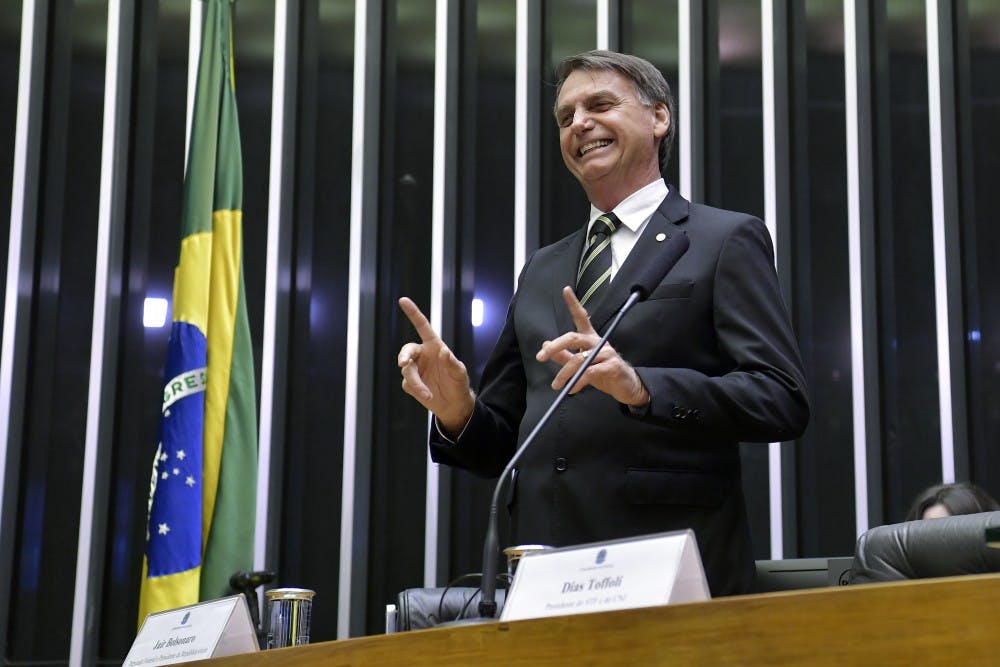
While he is heralding his victory as a “Celebration of Freedom,” and promising that his government will be a “defender of the Constitution, democracy and liberty,” Brazil's president-elect Jair Bolsonaro presents a new political reality to many people worldwide — including presumably the 75 or so Brazilians who are part of the Penn community.
After all, Bolsonaro’s election last week represents the most dramatic shift to the right in Brazilian politics in over 30 years, when the country officially transitioned from various military despots to democracy in 1985. Indeed, Bolsonaro’s politics are even farther to the right than those of any other leaders in South America, despite the fact that voters have in recent years already “embraced more conservative leaders in Argentina, Chile, Peru, Paraguay, and Colombia.” The country is Latin America’s largest, and the globe’s fifth most populous, meaning that Brazil's rightward shift should be of significance to domestic and international observers alike.
A retired army officer, Bolsonaro rose to victory despite his own personal history of controversial statements and his campaign’s extremist rhetoric. In 2003, he pushed a congresswoman, telling her that he “would never rape you, because you do not deserve it.” He’s threatened “to destroy, jail, or drive into exile his political opponents.” Perhaps most disturbing, Bolsonaro consistently exalts Brazil’s former brutal military dictatorships, candidly supporting the use of torture, saying “if a few innocent people die, that’s alright.”
College freshman Guilherme Grupenmacher, from Curitiba, Brazil, shared some insight on what these comments mean to him, saying “The legacy of the Brazilian military dictatorship is one that still heavily permeates the modern society we live in today. In high school, my teachers would tell me the stories of how they struggled to come [to] terms with becoming educators because of how censored the educational system was in the country.”
“My grandma recently told me about how she was separated from one of her best friends, who was exiled to France due to her husband's left-leaning political activism,” Grupenmacher said. “While Brazil grew economically during this time, nobody, not even Bolsonaro, should be speaking of it admirably.”
Like Trump, candidate Bolsonaro has also lambasted his critics, accusing them of spreading fake news. Worryingly, he plans to escalate this strategy because “attacking critical press outlets almost daily on social media is not enough. Once in office he vows to hit their bottom line” by pulling government advertising out from under publications hostile to him, his supporters, and his policies.
How could such a controversial figure come out of nowhere to become so extraordinarily popular?
Many believe Bolsonaro will bring strong economic growth, a more internationally engaged Brazil, and a more efficient, structured, and productive government. Others are disillusioned with the current administration, believing that it’s become engulfed with “greed and hubris and the palpable failure of its left-wing ideology.” Bolsonaro has also promised to root out nepotism, appointing his cabinet on the basis of merit and not political favors. However, more than anything, Brazilians’ fatigue and anger with the relentless corruption of many of the nation’s politicians and business leaders have fueled Bolsonaro’s popularity, causing them to ignore his past transgressions.
Wharton sophomore Nicholas Goldlust, from Sao Paulo, Brazil, believes Bolsonaro could benefit his hometown. He said, “It is certain he will bring change to the country and change is what Brazil ultimately needs! Bolsonaro's economic team is led by Paulo Guedes, who has been a prominent name in the Brazilian financial sector. Guedes will reduce the role of the state in the economy by privatizing government-owned companies and reducing corporate taxes, which will start to revitalize our economy by stimulating business. Also, just because of his election, the Brazilian stock exchange has gone up and the Brazilian real appreciated against the dollar."

Goldlust went on, saying that “Even though Jair Bolsonaro has a history of making nasty, sexist, and violent comments, solely judging on the current state of corruption in Brazil and the opportunities Bolsonaro’s team have at hand, I think that ultimately his government will improve the nation, providing the country the opportunities it needs to get back on track.”
In terms of recent Brazilian corruption, the nation truly has been been going through a crisis. An investigation, code-named Lava Jato or “Operation Car Wash,” launched in 2014, uncovered a web of fraud unprecedented by even Latin American standards. While initially described as the "biggest corruption scandal in the history of Brazil,” the dragnet quickly widened to include “other countries and foreign firms.” The ongoing investigation has exposed bribes across the globe, involving “illegal payments of more than $5 billion to company executives and political parties.” So far, the investigation has resulted in the indictments of two former presidents; Luiz Inácio Lula da Silva was convicted of money laundering, and Dilma Rousseff was impeached.
Grupenmacher understands the situation well, having grown up in Curitiba, the city that currently houses the headquarters of the Car Wash operation. He put it bluntly, saying the investigation has “undoubtedly flipped our country upside down.”
This culture of corruption, combined with an economy on the brink of recession and an unprecedented increase in daily crime, has pushed people to gamble on something new.
Guilherme added that “Bolsonaro is definitely an outlier, but that doesn't necessarily entail that his election to the presidency was surprising to us. As a matter of fact, it even makes sense that this happened. [Many people] voted for Bolsonaro only because they didn't want to vote for the Workers Party (PT) which has been in power for more than 16 years and has pushed the country violently away from fulfilling its potential, especially in the last few years with rampant corruption and lacking economic administration. Bolsonaro isn't a good candidate, I would even dare to say he is a terrible candidate, but he is the least-worst of the two options.”
Although it is undeniable that Bolsonaro has said many reprehensible things, and there are clear dangers with his presidency, particularly when it comes to freedom of the press, considering the chaos of corruption Brazil has endured over the last few decades, he might, just might, be exactly what the country needs. Only time will tell.

SPENCER SWANSON is a College sophomore from London, studying political science. His email address is sswanson@sas.upenn.edu.
The Daily Pennsylvanian is an independent, student-run newspaper. Please consider making a donation to support the coverage that shapes the University. Your generosity ensures a future of strong journalism at Penn.
Donate







